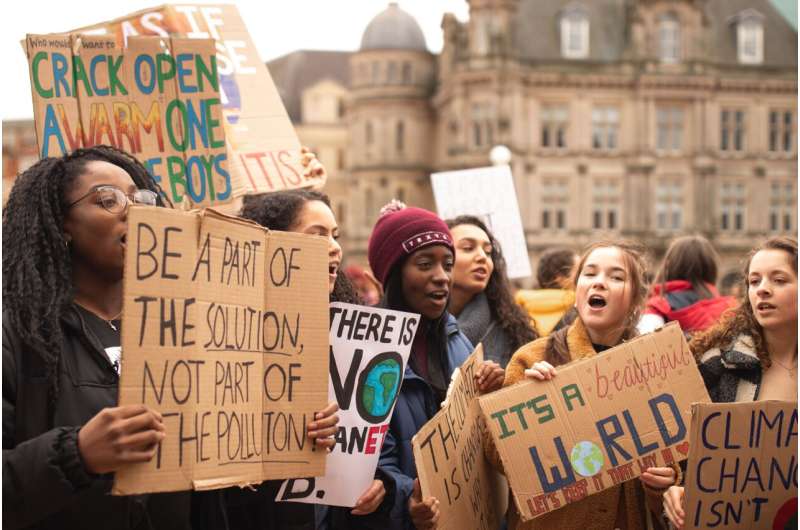This article has been reviewed according to Science X's editorial process and policies. Editors have highlighted the following attributes while ensuring the content's credibility:
fact-checked
peer-reviewed publication
trusted source
proofread
Millennials and Gen-Z have higher rates of climate worry, finds study

Millennials and Gen-Z experience greater levels of fear, guilt and outrage about the impacts of climate change compared to older Gen-X, baby boomer and post-war groups, new research suggests.
The research by the Center for Climate Change and Social Transformations (CAST), at Cardiff University and the University of Bath, collected data across the U.K. to examine generational differences in attitudes towards climate change.
The first-of-its-kind study found that younger age groups worry more about climate change, demonstrating a stronger emotional engagement with the topic than older age groups. The researchers also found that despite the significant differences in climate-related emotions between generations, understandings and perceived impacts of climate change were more comparable.
Lead author, Professor Wouter Poortinga of Cardiff University, said, "It is widely believed that younger generations are more engaged with climate change than older generations, but that has never been studied systematically.
"In our study, we found an overall pattern of higher levels of climate-related beliefs, risks perceptions and emotions among younger generation groups.
"However, the gap between generations about climate change is mainly in their emotional responses to climate change, rather than in beliefs about climate change. For example, there are no generational differences in beliefs in the causes and impacts of climate change, although older age groups are more likely to think that we are already feeling the effects of climate change."
The research team says the different emotional responses to climate change may be one of the reasons why younger generations demonstrate higher levels of activism and engagement with the issue.
The study used data from CAST's nationally representative surveys, conducted in 2020, 2021 and 2022. These annual surveys provide insights into public perceptions of climate change, asking around 1,000 respondents from across the U.K.
"While there is widespread awareness of climate change across all generations, younger generations feel much more threatened by it and have stronger emotional reactions. That is not completely surprising, given that younger generations will feel the brunt of the impacts of climate change, more so than older generations," said Professor Poortinga.
The team suggest that negative emotions can take a heavy toll on the younger generations' well-being, although they can also be an important driver of climate action.
"We however have to be careful not put the onus on younger generations to solve climate change. Older generations have a responsibility to take action now to mitigate climate change for future generations," added Professor Poortinga.
More information: Wouter Poortinga et al, Generational differences in climate-related beliefs, risk perceptions and emotions in the UK, Communications Earth & Environment (2023). DOI: 10.1038/s43247-023-00870-x
Journal information: Communications Earth & Environment
Provided by Cardiff University





















